Q&A with the IM Arizona champs
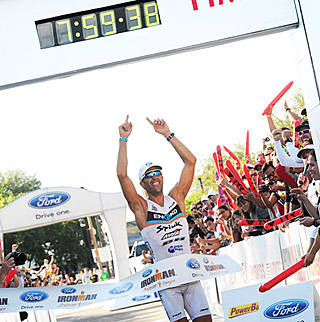
Both Eneko Llanos and Leanda Cave have star-studded triathlon careers. Llanos won the ITU long distance World Championship in 2003, won the XTERRA World Championship three times, has won many Ironman races and took the runner-up slot at Kona in 2008. Leanda Cave won the 2002 ITU Olympic distance World Championship, the 2007 ITU long distance World Championship, 4 Ironman 70.3 titles, silver at the 2010 Ironman 70.3 World Championship and two Escape From Alcatraz wins before taking a breakthrough 3rd at Ironman Hawaii last month.
But both of them satisfied previously unfulfilled career goals at the 7th Ford Ironman Arizona at Tempe last weekend. For Llanos, it was finally breaking the 8 hour barrier after two close calls at Frankfurt. For Cave, it was threefold – winning her first Ironman, breaking 9 hours, and running her first sub-3 hour Ironman marathon.
Cave and Llanos were interviewed in Tempe after the race.
ENEKO LLANOS
Slowtwitch: Did this race make up for your disappointing day at Kona?
Eneko Llanos: Yeah, I had a terrible day in Kona. I was in great form but I did not show it. Today, I was able to show it. I am so happy with my performance today. What a day!
ST: When you and Paul Amey, a three-time ITU duathlon World Champion with one of the sport's great runs, were dueling, how nervous were you?
Eneko: Well he start the run pretty fast and when he pass me about mile 9, the beginning of the second lap, I thought maybe he was pushing too hard. But you never know.
ST: What did you think of your chances at that time?
Eneko: Paul is a fantastic runner. I saw he was running fast and I can't keep up with him. So I'm going to focus on my own race, my own pace. Pretty soon, I saw he wasn't going too far. I was keeping an eye contact with him and slowly caught him again. I knew he was in reach. So I kept pushing and kept my pace and it worked.
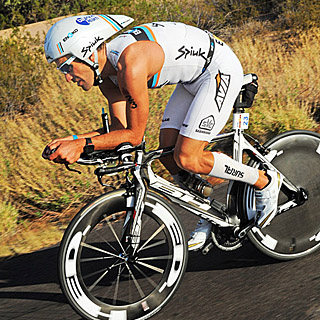
ST: Where did you catch him?
Eneko: I caught him at the beginning of the second lap [about mile 10] and then we ran together for 5 or 6 miles.
ST: What was the moment you broke away?
Eneko: There was a point when I saw her was struggling. First he lost one meter, then two meters – from then, I kept pushing.
ST: What happened to you at Kona?
Eneko: I had stomach problems. I still don’t know why. I quit after the bike because I was feeling bad and had lost too much time. I came to Kona in great form, maybe the best form of my life. And then I had too many problems.
ST: When did those stomach problems hit you in Kona?
Eneko: It was during the race. On the bike up to Hawi, about mile 60, I don't know what it was. Maybe something I ate.
ST: Things got better for you at XTERRA Worlds in Maui – which you have won three times. Were you encouraged or disappointed by your third place there?
Eneko: I was pretty good in Maui. But now I am not an XTERRA athlete, I am an Ironman athlete. And I got third place against a strong field. So I was strong. Very strong. Then I came to Tucson where I had a very solid three weeks of training. When I came here for the race, I was very relaxed and knowing I was in good form and I just went out to enjoy the race and to have fun. At the end, I felt very strong and had a good result.
ST: What did it mean to you to break eight hours?
Eneko: For me it was one of my biggest goals in triathlon. When I started racing Ironman, you always want to go sub 8. And I think I have been very close before. I did 8 hours 21 seconds in Frankfurt in 2009 [and 8:00:49 in Frankfurt in 2008]. It was very close, less than a minute.
ST: How good were the conditions in Tempe?
Eneko: Obviously the course was very fast and conditions were great. There was wind on the bike but still it was fast course. Conditions were great. It was a good day to go fast.
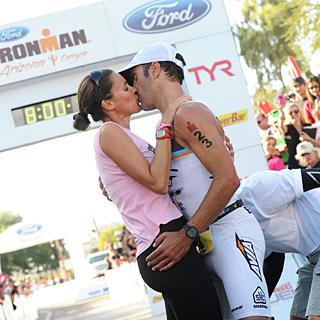
ST: You've always been an excellent cyclist. But you've never been known as an überbiker. But today you out-biked Jordan Rapp, Michael Weiss, Martin Jensen, and Sebastian Kienle. How did you set fastest bike with a 4:20:54 split?
Eneko: I knew it would be tough on the bike with Sebastian and Michi and the others. But I am good on these kind of courses.
ST: Relatively flat, like Ironman Texas [which Llanos won this May] ?
Eneko: I was feeling good and I broke away at the end of the third lap and I got a nice gap to start the run. I think that was the key.
ST: Does this give you confidence that you might win Kona one day?
Eneko: Well, I think Kona is a difficult race. There are many good guys I know I can be there on a good day. But I think you need a perfect day in Kona. to win. I know I have a chance. But I have so much respect for my other competitors. Obviously anyone who is there is a strong guy who can win on their day.
ST: You got second at Kona in 2008.
Eneko: Yes, I got second. I was very close and I want to try again!
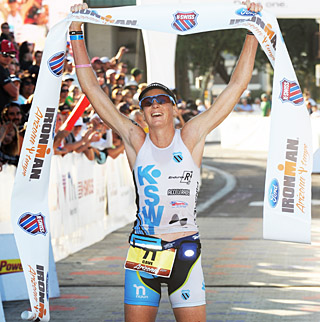
LEANDA CAVE
ST: With two world titles in hand, where does winning your first Ironman rank?
Leanda: I wanted to win an Ironman because I have wanted that on my resume. It was like when I won the [2002] ITU Olympic distance World Championship — I hadn't actually won a World Cup. It kind of doesn't mean a lot, but it means something to me to be able to say I've won at Ironman. And it makes people stand up and take notice when you win an Ironman. I certainly put that on my list of achievements now. Which I am really happy about.
ST: Although you went so fast and won by several minutes, it wasn't easy was it?
Leanda: I had a few mishaps to begin with. I had a cramp in the swim. Had a flat tire on my bike — and then my gears wouldn’t work. So, I knew it was going to be a long day.
ST: How did you keep your focus through all of those setbacks?
Leanda: I never give up. I just made the right race for myself. I stayed a little conservative on the bike. [still she biked a 2nd best 4:51:06]. My goals was to run a 3 hour marathon. I don’t know how I did. But I ran a sub 3 hour marathon. [a race best 2:58:51] That was my goal for the day. Winning was a bonus.
ST: When you have those kinds of troubles early on, do you just have to persevere through that?
Leanda: Yeah it is a long day. I just never give up. You never know what is going to happen out there. Every athlete has problems. I had a little inspiration from Sally Meyerhoff [the champion 10k (33:03 PR) and marathon (2:35) runner who died in March after being hit by a vehicle while cycling in Arizona] I wore that bracelet [honoring a charity in Meyerhoff's name] which gave me the incentive to remain positive. I kept looking at that and just saying, 'I've got to do this.' That kept me going today, to be honest.
ST: She was an Arizona resident and so are you. Had you met Sally?
Leanda: I met her a few times. I do know a lot of her friends, I know she was person with a great love for life. It was great today to be able to spread the word and draw attention to the charity in her name.
ST: You won your first Ironman. You broke eight hours. And you broke 3 hours…
Leanda: I'm ticking off a few boxes haven't, I? I didn’t go out with the intention of going under 8:50. [she finished in 8:49:00] I wanted to get a sub three hour marathon under my belt and make it a race at the same time. In the back of my mind I really wanted to win an Ironman.
ST: How ready were you to have the Ironman of your life?
Leanda: I hadn’t had the best preparation with racing so many races already. [She was 3rd at Ironman Hawaii, 2nd at the ITU long distance world championship in the past month] But I've definitely showed I am in good running shape [after running 3:06:36 at Ironman Hawaii]. So I wouldn't write myself off completely. You know every race I go in trying to win. Regardless. So I checked off a few boxes, achieved a few goals and this is a very good way to finish the season for me.
ST: What strategy did you have to run better than you ever have in an Ironman?
Leanda: I never really felt great running. But i just kept a really strong cadence going and I didn’t try and blow myself up on the first lap [of three on the run] I've done this race a few times and I've had places in those races where I've died. This year I wanted to play it conservative and finish strong as opposed to finishing weak and dying. Because every year someone has passed me on the last lap. So this year I wanted to stay strong and build into the run and that is what I did. Just stay consistent and staying on top of my nutrition was a big thing staying strong on the run.
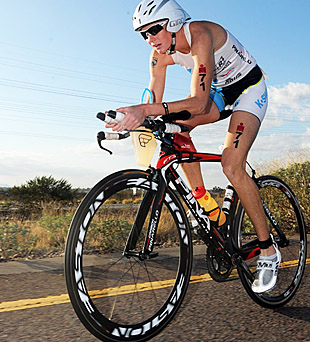
ST: Linsey Corbin said the new standard for women at the Ironman is now under nine hours. Agree?
Leanda: Yeah. The whole level of triathlon has been lifted. We can thank Chrissie [Wellington] for that. I think it's fair to say that Chrissie has some strong competition coming up this next year. I think we are all prepared now to take her on and give her a good run for her money.
ST: When you got that flat, how did you avoid getting frustrated and throwing your hands up in the air?
Leanda: I knew that there were spare wheels about there and I just had to get my hands on one. It was just a matter of time before I got back on my bike and got myself going again. It was just one of those scenarios. You never give up and kind of just deal with it and stay positive. So it didn't really faze me. I just dealt with it and got on with it. It is just part of racing.
ST: Was bike support there quickly?
Leanda: I ran back into transition to get a wheel and they didn’t have one. So they just put some air in my tire and then I just rolled out to find the spare wheels.
ST: You struggled a long time to get better at Ironman. After your breakthrough 3rd place at Kona, it might have been a good place to call it a year. Why did you come up with this?
Leanda: I just think it's come down to my body has adjusted to the sport of Ironman. I'm getting familiar with the distance.
ST: It didn’t come quickly for you.
Leanda: It’s taken a long time for me to develop as an Ironman athlete. It took me a long time to develop into an Olympic athlete as well. It wasn't something that came to me straight away. I'm just a slow learner. Now I think the confidence comes with that and the ability to race strong and over the distance to fee feel strong. I was wondering if the pain would ever stop? Everyone said no, it never stops. You just get used to it. But to be honest I am kind of getting used to it and I am kind of enjoying it now. I never thought I would.
ST: How close was Linsey on the run?
Leanda: I think after the bike I had two minutes. Then I held to a 3:30 advantage after a lap and a half on the run. After that, I managed to put another minute and a half on her. [Cave's final margin was 5:33]
ST: But this was not a wire to wire win?
Leanda: Amanda Stevens led on the swim and the bike. I caught her within half a lap on the run and I led from there to the end. I actually ran faster the second half of the run, which was nice to see. My goal was to go under three hours and I finally did it.
ST: What part did your coach Siri Lindley play in your increased confidence this year?
Leanda: Siri has always been great support — and I got a lot of confidence from racing Kona this year and having that run in Kona. Without all the stops I had on the run at Kona, I probably would have been close to the hours there as well.


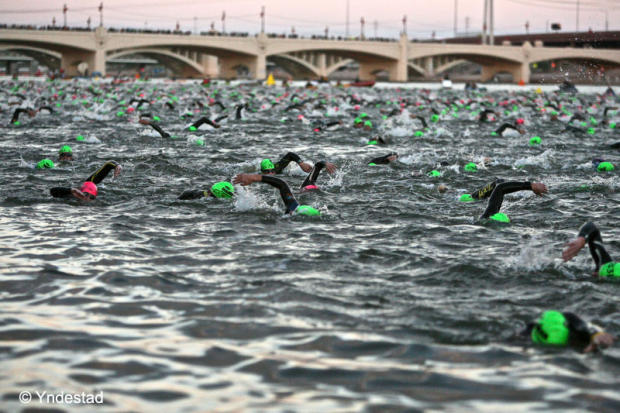
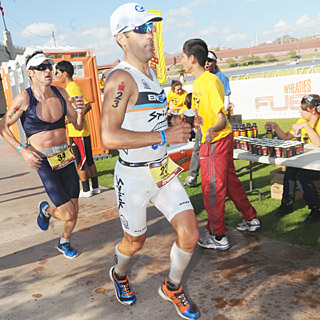
Start the discussion at slowtwitch.northend.network